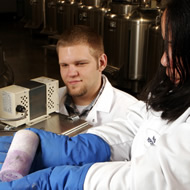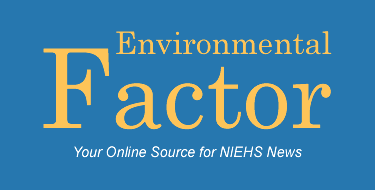
Environmental Factor, October 2008, National Institute of Environmental Health Sciences
Virtual Environmental Training for Latin American Women
By Eddy Ball
October 2008
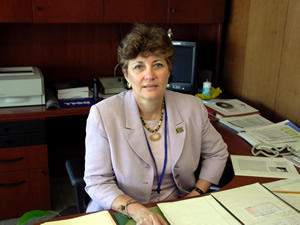

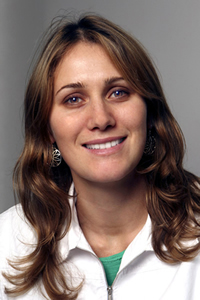
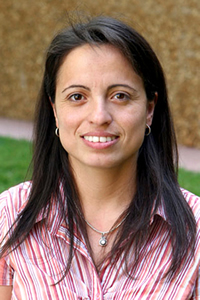
During a three-day workshop held September 3-5 in Washington, DC, a group of scientists, health professionals and educators met to discuss and plan a new virtual training program module for Hispanic women in the environmental health sciences. The 35 participants, who included two NIEHS postdoctoral fellows, represented organizations in the United States and more than a dozen Latin American nations — as well as a range of international groups.
To lay the groundwork for a training module on AIDS and environmental health, the workshop built on a successful generic pilot program discussed at a Leadership and Gender Symposium for Latinas (http://www.niehs.nih.gov/news/newsletter/2008/january/latinas.cfm) held December 3, 2007 in Bethesda and co-chaired by NIEHS Associate Director Sharon Hrynkow, Ph.D., and National Institute on Drug Abuse Director Nora Volkow, M.D.
NIEHS teamed up with the Pan American Health Organization (PAHO) (http://www.paho.org/) ![]() , Facultad Latinoamericana de Ciencias Sociales (FLACSO) (http://translate.google.com/translate?hl=en&sl=es&u=http://www.flacso.org/&sa=X&oi=translate&resnum=1&ct=result&prev=/search%3Fq%3DFacultad%2BLatinoamericana%2Bde%2BCiencias%2BSociales%26hl%3Den%26sa%3DG)
, Facultad Latinoamericana de Ciencias Sociales (FLACSO) (http://translate.google.com/translate?hl=en&sl=es&u=http://www.flacso.org/&sa=X&oi=translate&resnum=1&ct=result&prev=/search%3Fq%3DFacultad%2BLatinoamericana%2Bde%2BCiencias%2BSociales%26hl%3Den%26sa%3DG) ![]() , United Nations Educational, Scientific and Cultural Organization (UNESCO) for Latin America and the Caribbean (LAC) (http://portal.unesco.org/geography/en/ev.php-URL_ID=2316&URL_DO=DO_TOPIC&URL_SECTION=201.html)
, United Nations Educational, Scientific and Cultural Organization (UNESCO) for Latin America and the Caribbean (LAC) (http://portal.unesco.org/geography/en/ev.php-URL_ID=2316&URL_DO=DO_TOPIC&URL_SECTION=201.html) ![]() , and National Institute of Allergy and Infectious Diseases (NIAID) to convene the most recent discussion. In her opening remarks, PAHO Director Mirta Roses, M.D., pointed out why leadership and gender training for women scientists in LAC is so important.
, and National Institute of Allergy and Infectious Diseases (NIAID) to convene the most recent discussion. In her opening remarks, PAHO Director Mirta Roses, M.D., pointed out why leadership and gender training for women scientists in LAC is so important.
“Women in Latin America do not enjoy the same social status as men,” Roses noted. “At the same time, the relatively poorer health status of women in Latin America remains a problem. Women suffer gender-based violence, high rates of maternal mortality and morbidity and the disproportionate burden of mental illness. As scientists, women are a critical part of the solution, so we must empower them to engage and to overcome antiquated notions of their proper roles.”
In her opening comments, Hrynkow, co-chair of the meeting, welcomed NIAID and PAHO as new partners, while recognizing the importance of contributions from the Fogarty International Center, NIEHS, NIDA, NIH Office of Aids Research and UNESCO in creating, enabling and implementing the pilot. Hrynkow also provided historical perspectives on the genesis of the program, noting the original goal of training great leaders as well as great scientists. She noted as well the clear window of opportunity at this point in time to advance women’s leadership training on global health challenges.
Alicia Aleman, M.D., an OB/GYN in Uruguay who trained in the United States on a Fogarty fellowship, provided her perspective as a “graduate” of the pilot training program. Her comments focused on the value of the virtual community of women scientists created by the program and the benefits of having mentors available via the Internet with whom she could share experience and thoughts in real-time. According to Aleman, there is a critical shortage of qualified mentors in many countries, and the use of the Internet to create mentor relationships was invaluable as she made critical career path and scientific decisions.
The workshop focused on two health challenges facing Latin America — the growing AIDS epidemic and the burden of ill health due to environmental conditions. Concurrent sessions examined the pilot curriculum and teaching strategies with a view toward adapting them to meet the needs of the women scientists working on AIDS, environmental health and related issues, such as water quality and sanitation.
The enthusiasm of participants for this unique training program and its next steps was palpable. NIEHS post-doctoral fellows Karina Rodriguez, Ph.D., originally from Peru, and Danielle Duma, Ph.D., a native of Brazil, participated in the meeting to share their perspectives as potential end-users.
NIEHS and partner agencies in the PAHO meeting will begin to work with the Organization of American States’ Inter-American Commission of Women (http://www.oas.org/CIM/english/About.htm) ![]() to consider support for the further elaboration of the curricula and the launch of the next phase of the program.
to consider support for the further elaboration of the curricula and the launch of the next phase of the program.
"NTP Finalizes Report..." - previous story ![]()
![]() next story - "NIEHS Distinguished Lecturers..."
next story - "NIEHS Distinguished Lecturers..."
October 2008 Cover Page
